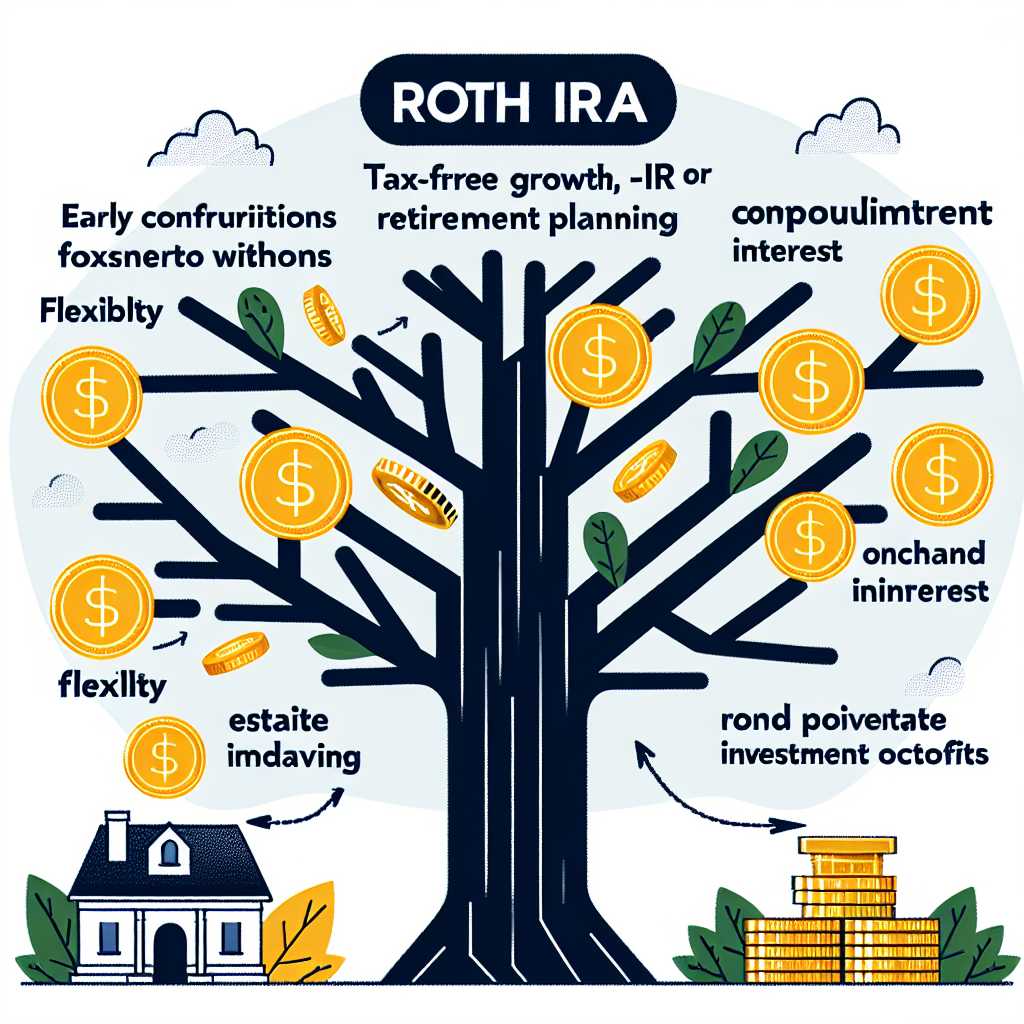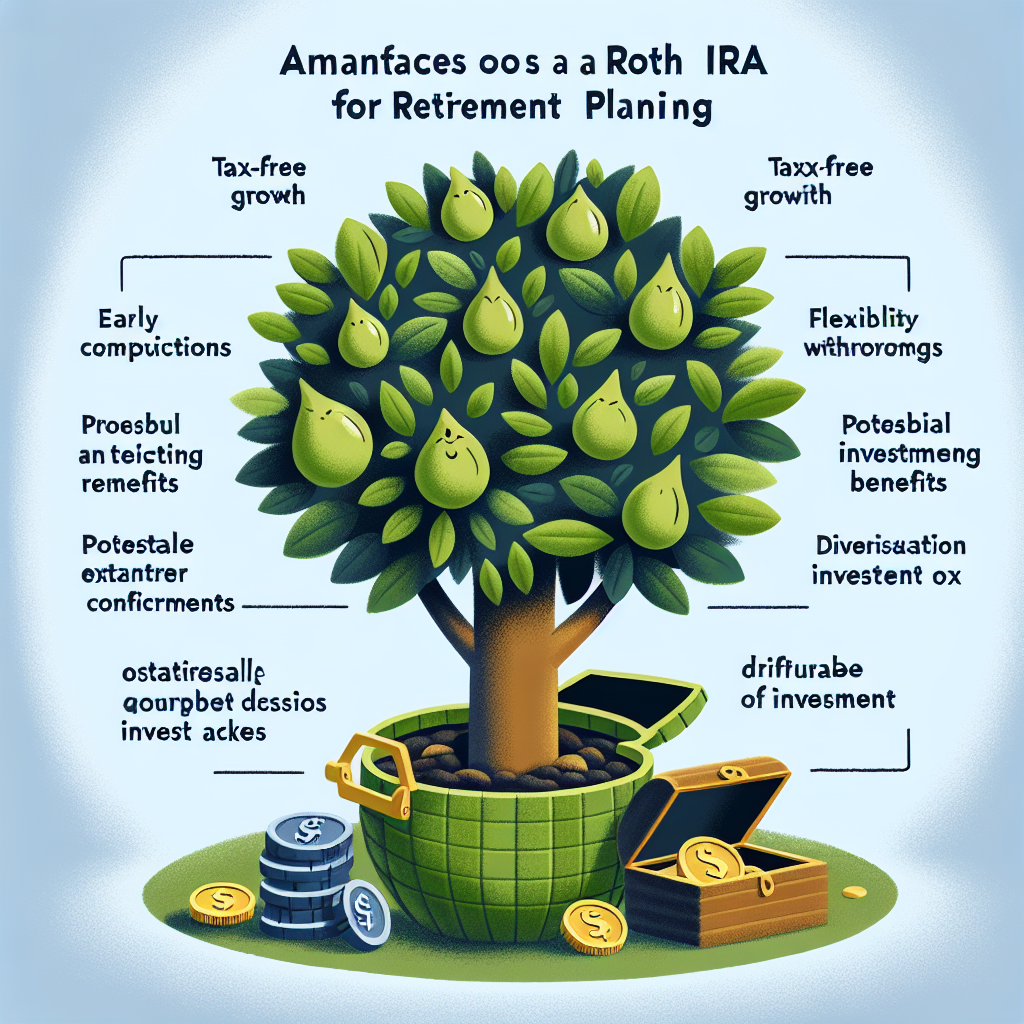Imagine being able to enjoy your retirement without worrying about taxes eating away at your hard-earned savings. With a Roth IRA (or similar accounts), you can make this dream a reality. These retirement accounts offer numerous benefits, ensuring a secure and financially sound future. From tax-free withdrawals to flexible contribution limits, a Roth IRA provides a wealth of advantages that will help you retire with peace of mind. Discover how this type of account can transform your retirement savings and secure a comfortable future for you and your loved ones.
Tax Advantages
Tax-free Withdrawals
One of the key advantages of a Roth IRA is the ability to make tax-free withdrawals in retirement. Unlike traditional IRAs or 401(k) plans, where withdrawals are typically subject to income tax, qualified Roth IRA withdrawals are completely tax-free. This means that you can withdraw the funds you’ve contributed, as well as any investment earnings, without owing any taxes. This can be a huge financial benefit, as it allows you to enjoy your retirement income without worrying about a big tax bill.
Tax-free Growth
In addition to tax-free withdrawals, Roth IRAs also offer tax-free growth. This means that any investment earnings you accumulate within your Roth IRA are not subject to any taxes. With traditional retirement accounts, you would have to pay taxes on your investment gains when you withdraw them in retirement. But with a Roth IRA, your earnings can grow and compound over time, without being diminished by taxes. This can significantly enhance the growth potential of your retirement savings.
No Required Minimum Distributions
Another advantage of a Roth IRA is that there are no required minimum distributions (RMDs) once you reach a certain age. Traditional IRAs and 401(k) plans require you to start taking withdrawals by age 70 ½, regardless of whether or not you actually need the money. This can sometimes force retirees into taking distributions they don’t actually need, potentially pushing them into higher tax brackets. With a Roth IRA, you have the freedom to let your money continue growing tax-free for as long as you want, without any mandatory withdrawals.
No Taxes on Qualified Distributions
Lastly, Roth IRAs offer the benefit of no taxes on qualified distributions. To be considered a qualified distribution, you must have held the Roth IRA for at least five years and be over the age of 59 ½. When you meet these requirements, you can withdraw both your contributions and any investment earnings tax-free. This can provide you with tremendous flexibility in how you choose to access and use your retirement funds, allowing you to maximize your financial security in retirement.
Flexible Contributions
Contribution Flexibility
One of the advantages of a Roth IRA is the flexibility it offers when it comes to contributions. Unlike traditional IRAs or 401(k) plans, there are no age limits for making contributions to a Roth IRA. This means that as long as you have earned income, you can continue contributing to your Roth IRA, regardless of your age or whether or not you are retired. This flexibility allows you to continue growing your retirement savings even after you’ve reached traditional retirement age, providing you with additional financial security in your later years.
No Age Limit
In addition to the flexibility in making contributions, Roth IRAs also have no age limit for making withdrawals of your contributions. This means that if you need to access the money you’ve contributed to your Roth IRA before reaching retirement age, you can do so without facing any penalties or taxes. This can be particularly beneficial in times of financial need or unexpected expenses, giving you peace of mind knowing that your Roth IRA funds are accessible if you really need them.
Tax-Free Withdrawals of Contributions
Furthermore, while it’s generally recommended to leave your Roth IRA funds untouched until retirement, there is an additional advantage in that you can withdraw your contributions at any time, tax-free and penalty-free. This unique feature sets Roth IRAs apart from other retirement accounts, as it allows you to potentially use your contributions for other purposes, such as financing a home purchase or paying for higher education expenses, without any tax consequences. However, it’s important to consider the long-term implications of withdrawing your contributions early, as doing so may significantly impact your future retirement savings.

Greater Control and Accessibility
Access to Contributions Anytime
With a Roth IRA, you have the advantage of being able to access your contributions at any time and for any reason. This can provide a significant level of financial flexibility and control over your retirement savings. Whether you need the funds for a major purchase, unexpected medical expenses, or any other financial need, you have the ability to tap into your Roth IRA contributions without facing any penalties or taxes. This can be particularly comforting to know that your hard-earned money is easily accessible when you truly need it.
Access to Contributions Penalty-Free
In addition to being able to access your contributions at any time, Roth IRAs also allow penalty-free access to any investment earnings under certain circumstances. If you’ve held the account for at least five years and are at least age 59 ½, you can withdraw your investment earnings without owing any taxes or penalties. This added accessibility can be a valuable feature for retirees who may need to supplement their income or cover unexpected expenses later in life.
Continuous Contribution Opportunities
Unlike some retirement accounts that have age limits for contributions, Roth IRAs offer continuous contribution opportunities. This means that as long as you have earned income, you can continue to contribute to your Roth IRA, regardless of your age or retirement status. This is especially beneficial for individuals who wish to work beyond traditional retirement age or start their retirement income gradually. With a Roth IRA, you can continue building your retirement savings while having the freedom to choose when and how you transition into retirement.
Control over Investment Options
Another advantage of having a Roth IRA is having control over your investment options. With a Roth IRA, you typically have a wide range of investment options to choose from, including stocks, bonds, mutual funds, and exchange-traded funds. This flexibility allows you to tailor your investment strategy to your financial goals and risk tolerance. You can also actively manage your investments and make changes as needed, giving you greater control over the growth and preservation of your retirement savings.
Estate Planning
Pass on Tax-Free Inheritances
One notable benefit of a Roth IRA is that it allows you to pass on tax-free inheritances to your beneficiaries. Unlike traditional IRAs or 401(k) plans, where beneficiaries may have to pay income tax on inherited funds, with a Roth IRA, your beneficiaries can receive the funds tax-free. This can be a significant advantage in estate planning, as it allows you to transfer your wealth to your loved ones without burdening them with tax obligations. By strategically designating beneficiaries, you can ensure that your Roth IRA funds are preserved and passed on to future generations with minimal tax consequences.
No Income Limit for Beneficiaries
Another advantage of a Roth IRA is that there is no income limitation for beneficiaries who inherit the account. This means that regardless of your beneficiary’s income level, they can receive the Roth IRA funds tax-free. This can be particularly beneficial if you have high-earning beneficiaries who may be subject to higher income tax rates. By leaving them a Roth IRA, you can provide them with a tax-efficient inheritance that can significantly enhance their financial well-being.
No Tax on Transfers to Spouses
In the case of transferring a Roth IRA to a spouse, there are additional advantages. If you pass away and your spouse is named as the beneficiary of your Roth IRA, they can choose to treat the account as their own. This means that they can continue contributing to the Roth IRA and enjoy tax-free growth and withdrawals, just as if they had originally owned the account. This can be a powerful estate planning tool, as it allows you to transfer your Roth IRA to your spouse without triggering any tax consequences and ensure that they have ongoing financial security in retirement.
Stretch Roth IRA
To further enhance the estate planning benefits, the concept of a “stretch Roth IRA” can be employed. This strategy allows your beneficiaries to “stretch” the tax advantages of the Roth IRA over their lifetime. Rather than taking a lump sum distribution, which may be subject to higher tax rates, beneficiaries can choose to take required minimum distributions (RMDs) based on their own life expectancy. This allows the funds within the Roth IRA to continue growing tax-free for an extended period, potentially providing your beneficiaries with a significant nest egg for their own retirement.

Diversification and Investment Growth
Wide Range of Investment Options
In terms of investment opportunities, Roth IRAs offer a wide range of options to suit your financial goals and risk tolerance. While traditional IRAs may have limitations on the types of investments you can hold, a Roth IRA typically allows you to invest in various asset classes, including stocks, bonds, mutual funds, ETFs, and even alternative investments like real estate or precious metals. This diversification can help you spread risk and potentially increase your investment returns over the long term.
Potentially Higher Returns
With a Roth IRA, you have the potential to earn higher returns on your investments compared to a traditional IRA or 401(k) plan. Since qualified withdrawals from a Roth IRA are tax-free, you don’t have to worry about paying taxes on your investment gains in retirement. This means that any earnings within your Roth IRA can compound and grow exponentially, providing you with potentially higher returns over time.
Ability to Reinvest Dividends
Roth IRAs also offer the advantage of allowing you to reinvest dividends. When you own stocks or funds within your Roth IRA that pay dividends or capital gains, you can choose to automatically reinvest those earnings back into your account. This can help accelerate the growth of your investments, as the reinvested dividends can generate additional returns that compound over time. The ability to reinvest dividends allows you to take full advantage of the power of compounding, helping you maximize your investment growth potential.
Ample Time for Compounding
Another benefit of a Roth IRA is the opportunity for your investments to compound over several decades. Since Roth IRAs have no required minimum distributions during your lifetime, you can allow your investments to grow tax-free for a longer period compared to other retirement accounts. This extended time horizon can significantly enhance the power of compounding, as you can reinvest your earnings and let your investments grow exponentially over time. The longer your investments have to compound, the more substantial your retirement savings can become.
Protection from Future Tax Increases
Tax-Free Status
One of the primary advantages of a Roth IRA is its tax-free status. By contributing after-tax dollars to your Roth IRA, you effectively lock in your tax liability at your current tax rate. This can be particularly beneficial if you anticipate that tax rates may increase in the future. With a Roth IRA, you are shielded from potential future tax increases, as your withdrawals in retirement remain tax-free, regardless of any changes to the tax code.
Shielding Against Future Tax Brackets
In addition to protecting against future tax increases, a Roth IRA can also shield you against potential changes in your income during retirement. Since the withdrawals from a Roth IRA are tax-free, you have the flexibility to manage your income and control your tax liability in retirement. This can be especially valuable if you anticipate a higher income level in retirement or if you want to avoid being pushed into a higher tax bracket due to large required minimum distributions from traditional retirement accounts.
Hedge Against Inflation
Another advantage of a Roth IRA is that it can serve as a hedge against inflation. While the purchasing power of the dollar may erode over time due to inflation, the value of your Roth IRA remains intact. With tax-free growth and the ability to withdraw your funds without owing any taxes, a Roth IRA can help you maintain your financial security and purchasing power in retirement, even in the face of rising prices and inflationary pressures.
Minimization of Taxable Social Security Benefits
Since withdrawals from a Roth IRA are not subject to income tax, they also don’t count towards the calculation of your taxable Social Security benefits. This can be a significant advantage in retirement planning, as it allows you to minimize the tax impact on your Social Security income. By strategically managing your withdrawals from your Roth IRA, you can potentially reduce your taxable income and maximize the amount of your Social Security benefits that remain tax-free.

No Age-Related Requirement
No Required Minimum Distributions (RMDs)
Unlike traditional IRAs or 401(k) plans, Roth IRAs do not have any required minimum distributions (RMDs) during your lifetime. This means that you have the freedom to keep your money invested and growing within your Roth IRA for as long as you want. While RMDs from traditional retirement accounts can sometimes force you to take distributions you don’t actually need, a Roth IRA allows you to maintain control over your retirement savings and decide when and how you want to use them.
Allows for Longer Accumulation Phase
The lack of required minimum distributions in a Roth IRA allows for a longer accumulation phase during your lifetime. With other retirement accounts, you are required to start taking distributions by age 70 ½, which can limit the time your money has to grow tax-free. However, with a Roth IRA, you can let your investments continue compounding and potentially accumulating wealth well into your retirement years. This extended accumulation phase can result in a larger nest egg and a more comfortable retirement.
Maintain Control over Retirement Savings
By not having to take required minimum distributions, a Roth IRA gives you the ability to maintain control over your retirement savings. This can be particularly advantageous if you don’t need the money immediately or if you want to leave a legacy for your loved ones. You have the flexibility to decide when to withdraw funds from your Roth IRA, allowing you to strategically plan your withdrawals based on your financial needs and tax situation.
Continue Growing Retirement Funds
Finally, the absence of required minimum distributions in a Roth IRA allows your retirement funds to continue growing tax-free. This can result in significant long-term benefits, as your investments have more time to compound and potentially generate higher returns. By keeping your money invested in the Roth IRA, you can take advantage of the power of compounding and maximize the growth of your retirement funds over time.
Tax Diversification and Risk Management
Balancing Taxable and Tax-Free Assets
A Roth IRA can play a crucial role in tax diversification and risk management within your overall investment portfolio. By having a mix of taxable and tax-free assets, you can strategically manage your tax liability in retirement. Traditional retirement accounts, such as IRAs and 401(k) plans, are subject to income tax upon withdrawal. By having a Roth IRA, you can potentially minimize your future tax burden by using tax-free withdrawals from the Roth IRA to supplement your taxable income from other sources. This balanced approach allows you to enjoy tax diversification and create a more tax-efficient retirement strategy.
Reducing Future Tax Liabilities
Owning a Roth IRA can also help reduce your future tax liabilities. By contributing after-tax dollars to a Roth IRA, you effectively lock in your current tax rate. This can be particularly advantageous if you anticipate that your income will be higher in the future, which could result in a higher tax rate. By contributing to a Roth IRA now, you can potentially avoid paying taxes at a higher rate on your retirement savings later on.
Avoidance of Higher Tax Brackets
In addition to reducing future tax liabilities, a Roth IRA can help you avoid higher tax brackets in retirement. Withdrawals from traditional retirement accounts are typically subject to income tax, which means that larger withdrawals can potentially push you into a higher tax bracket. However, with a Roth IRA, your withdrawals are tax-free, ensuring that your income remains within a lower tax bracket. This can help you maximize your retirement income and minimize the impact of taxes on your overall financial picture.
Flexibility for Tax Planning
Having a Roth IRA provides flexibility for tax planning strategies in retirement. With a mix of taxable and tax-free assets, you can strategically manage your withdrawals to minimize your tax burden. By carefully selecting which accounts to withdraw from and in what amounts, you can optimize your tax situation and potentially reduce your overall tax liability. This flexibility allows you to adapt to changing tax laws and regulations, ensuring that your retirement income remains as tax-efficient as possible.

Protection from Creditors
Asset Protection
One of the advantages of a Roth IRA is that it can offer a certain level of asset protection. In many states, Roth IRAs are protected from creditors in the event of bankruptcy. This means that if you find yourself in financial hardship and have to file for bankruptcy, your Roth IRA funds are generally safe from being seized by creditors. This protection can provide you with peace of mind, knowing that your retirement savings are secure and cannot be used to satisfy outstanding debts.
Exemption from Bankruptcy Proceedings
In addition to asset protection, Roth IRAs are also exempt from bankruptcy proceedings. This means that even if you have to file for bankruptcy, your Roth IRA won’t be considered as part of your bankruptcy estate. As a result, you can potentially retain your Roth IRA funds and continue to enjoy the tax advantages and growth potential that they offer. This exemption can be a valuable safeguard, ensuring that your retirement savings remain intact even in challenging financial situations.
Safeguarding Retirement Assets
Another advantage of a Roth IRA is that it safeguards your retirement assets. While other types of investments and savings may be vulnerable to legal actions or financial difficulties, your Roth IRA funds can be protected. Whether it’s a lawsuit or personal financial difficulties, having a Roth IRA can provide a level of security and ensure that your retirement savings are shielded from potential threats.
Protection against Lawsuits
Roth IRAs can also offer protection against lawsuits and legal claims. In many states, Roth IRAs are considered to be “judgment-proof” assets, meaning they cannot be seized or garnished in the event of a lawsuit or legal judgment against you. This protection can be especially valuable if you work in a profession that carries a higher risk of litigation. By keeping your retirement savings in a Roth IRA, you can have peace of mind knowing that your hard-earned money is safeguarded and protected from potential litigation risks.
Income Stream and Financial Security
Stable Retirement Income
A Roth IRA can provide a stable income stream in retirement, helping to ensure your financial security. Unlike a traditional IRA or 401(k) plan, which typically require you to take taxable distributions during retirement, a Roth IRA allows you to withdraw funds tax-free. This means that you can rely on a consistent income stream from your Roth IRA without worrying about the impact of taxes on your retirement funds. This can provide you with the peace of mind and stability you need to enjoy your retirement years to the fullest.
Protection from Outliving Savings
Another benefit of a Roth IRA is that it can protect you from outliving your savings. By contributing to a Roth IRA throughout your working years, you can build a substantial nest egg that can last well into your retirement. Since Roth IRA withdrawals are tax-free, you can withdraw the funds you need without depleting your savings or worrying about running out of money in your later years. This protection against longevity risk can provide you with financial security and peace of mind, knowing that your retirement savings will last as long as you do.
Supplemental Income Source
In addition to providing a stable income stream, a Roth IRA can also serve as a supplemental income source in retirement. Since there are no required minimum distributions, you have the flexibility to withdraw funds from your Roth IRA as needed to cover any unexpected expenses or emergencies that may arise. This supplemental income can be particularly valuable if you face unexpected medical costs or if you want to treat yourself to a dream vacation or other leisure activities in retirement.
Enhanced Financial Security
Overall, a Roth IRA can provide enhanced financial security in retirement. With its tax advantages, flexible withdrawal options, and potential for long-term growth, a Roth IRA can help you build a solid financial foundation for your retirement years. By taking advantage of the tax-free growth and withdrawals, you can ensure that your retirement income remains stable and secure, regardless of any changes in the tax code or economic conditions. This enhanced financial security allows you to focus on enjoying your retirement and pursuing your dreams with confidence.


